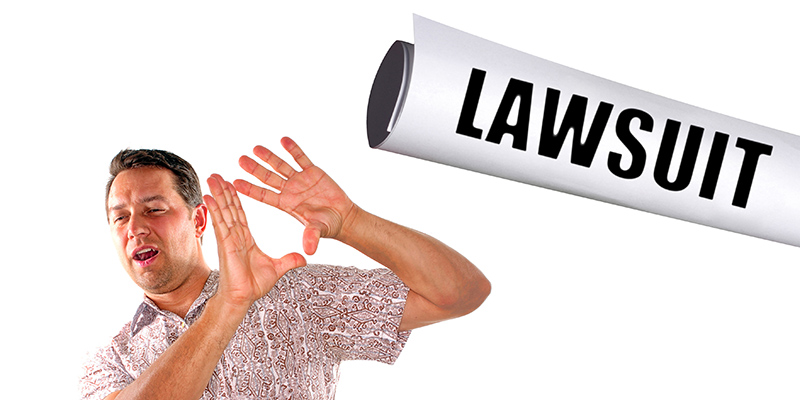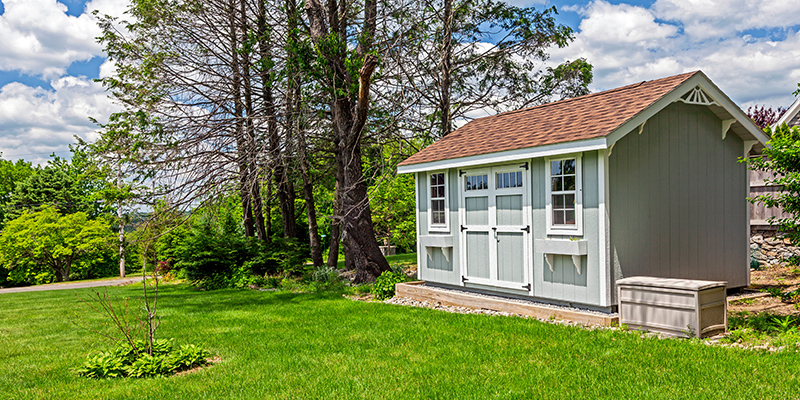Can Homeowners Sue HOA Board Members Or The Condo Board?

HOA board members are always concerned about getting sued. A lawsuit is a very serious matter; it can be quite a drain on one’s time, energy, finances, resources, and emotions. Many of us ask, “Why volunteer as a board member if it will only bankrupt me?” The good news is that this does not happen as much as we think. To further provide clarity on this matter, we’ll answer the commonly asked question, "Can you sue HOA board members for bad decisions?"
Browse By Category
Sign up for Our Newsletter
HOA board members are always concerned about getting sued. A lawsuit is a very serious matter; it can be quite a drain on one’s time, energy, finances, resources, and emotions. Many of us ask, “Why volunteer as a board member if it will only bankrupt me?” The good news is that this does not happen as much as we think. To further provide clarity on this matter, we’ll answer the commonly asked question, “Can you sue HOA board members for bad decisions?”
Can You Sue HOA Board Members?
If a homeowner were to ask, “Can condo board members be sued?” Yes, because a person can be sued by anyone for anything at any time. A disgruntled homeowner can always choose to sue both the condo or HOA board and its individual members. However, if the question is, “Are HOA or condo board members personally liable for their bad decisions?” — the answer is not as straightforward.
An HOA or condo board member can be protected from liability in case of a lawsuit. This will be clearly stated in your association’s articles of incorporation, bylaws, or governing documents. There are also other provisions that offer protection when homeowners are suing the condo board of directors or HOA board of directors.
What Do State Laws Say?
A lot of states have laws in place that protect board members from personal liability to an extent. For instance, in California, Civil Code Section 1365.7 states that volunteer association board members aren’t personally liable for damages beyond what the HOA’s insurance covers.
These damages can include property damage, emotional distress, bodily injury, and even wrongful death. Of course, board members must meet certain requirements to qualify.
Not all states have the same law as California, though. Therefore, you must research your own state laws to check which ones apply to you as a board member. You can also consult an HOA attorney for clarification.
Understanding the Business Judgement Rule
When a homeowner is suing the HOA board or condo board members, they can use the Business Judgement Rule to protect themselves from liability. According to the law, the board of directors is immune from personal liability when it can be proven that their actions or decisions were reasonable and made in good faith.
More often than not, the Business Judgement Rule rules in favor of the board of directors. This means when homeowners sue condo board or HOA board members, a judge may throw out the case if the board member acted within the scope of their authority. Such an argument may stand even if the board member’s decision was, in the end, a bad one.
The key here is to establish whether the condo board member upheld their fiduciary duty and acted in the best interest of the association. If they didn’t, it can lead a homeowner to sue HOA for breach of fiduciary duty.
It’s also important to note the reason why the Business Judgement Rule is predisposed to favor the board. Board members are ultimately volunteer positions and they are not compensated for the service they provide to the association. So if there were no legal protections for the members, no one would even volunteer to join the board.
The courts understand that board members are not perfect. People won’t always make the right decision every time. However, if it is clear that the board member did not act fraudulently or unconscionably, the judge will not proceed with the suit.
Can HOA Board Members Be Held Liable?
This is a question many board members ask, and one that holds back a lot of residents from volunteering to run for positions on the board. So, are HOA board members personally liable in some cases?
HOA and condo board members should know, though, that they are not completely immune from personal liability. If the court finds that a board member engaged in fraudulent or malicious behaviors, they will be held accountable for their actions.
This could be when a board member takes advantage of the benefits that are not available to non-board members. It could also be when a board member borrows or uses the association’s funds for personal use.
A board member can be personally liable if they were negligent in their duties. If there are problems because the board treasurer did not check financial reports against bank accounts, they can potentially get sued.
Homeowners can also sue a board member if he puts his personal interests above the community. For example, a board member will hire a service provider owned by their family members rather than one that is most qualified for the job.
What Can You Sue an HOA For?
Although it’s not uncommon to find homeowners suing condo board of directors, you must know that such lawsuits are usually unsuccessful. Still, as a board member, you shouldn’t become lax or abuse your power in any way.
While homeowners can try to sue board members for just about anything, the most common reasons include the following:
- Failure to maintain common areas or elements. HOAs are responsible for the maintenance and upkeep of common spaces and elements. When they fail to do that, homeowners can sue.
- Selective enforcement. If an HOA board does not uniformly enforce rules, homeowners can sue HOA for selective enforcement.
- Misuse of funds. Theft, embezzlement, or fraud happens all the time — even in an HOA or condo association setting.
- HOA Discrimination. Can I sue my HOA for discrimination? Yes. When an HOA board violates federal and state Fair Housing laws, homeowners can sue for discrimination.
- HOA board members harassment. Board members who harass other members or abuse their power can use the law as a weapon to protect themselves and seek retribution.
- Negligence. Can I sue my HOA for negligence? Board members have certain fiduciary duties to uphold, which include the duty of care. Failure to uphold these duties can result in homeowners suing HOA for negligence. The same goes for condo associations. Owners can sue condo association for negligence.
Specific Reasons to Sue an HOA Board
Can you sue HOA board members for anything? More specifically, homeowners might sue an HOA board for the following actions:
- Failure to maintain community amenities and common areas
- Inadequate or lack of security (such as placing security cameras at gates or on private roads)
- Remodeling disputes or denial of architectural changes
- Holiday decoration disputes
- Flag restriction disputes
- Election disputes
- Pet disputes
Specific Reasons to Sue a Condo Board
On the other hand, here are some possible reasons for suing condo association boards:
- Failure to maintain common elements, such as walls, plumbing, etc.
- Failure to ensure safety in common or shared spaces (such as security cameras in hallways, maintaining fire alarms, removing fire hazards, maintaining elevators, etc.)
- Election disputes
- Pet disputes
How Can HOA Board Members Protect Themselves?
 It is comforting to know that HOA and condo board members have some legal protections. However, regardless of whether the judge votes in their favor, board members still worry about the legal expenses and resources needed to respond to an HOA lawsuit.
It is comforting to know that HOA and condo board members have some legal protections. However, regardless of whether the judge votes in their favor, board members still worry about the legal expenses and resources needed to respond to an HOA lawsuit.
Your condo association’s insurance should cover all your legal expenses. Some insurance companies may cover legal expenses under the general liability policy. However, board members should seriously consider adding Directors and Officers insurance.
With D&O insurance, board members can expect their insurance company to provide the money for legal counsel and other expenses. This insurance type also protects board members’ personal assets from litigation.
If a homeowner sues both the board and its individual members, a board member can seek separate counsel. This will protect the personal interests of the board member. However, the board member can still ask the association or its insurance company to take care of the legal expenses.
Meanwhile, condo associations should also consider Crime and Fidelity insurance coverage or Employee Dishonesty insurance coverage. These will protect the association should a board member commit a criminal act such as fraud or embezzlement. With this kind of insurance, the association will not be held liable for the money that may have been stolen or misused by the board member.
What to Do If You Are Personally Sued
Can a nonprofit board member be sued individually? The short answer is yes. Try as you may, you can’t please everyone in your HOA or condo community. Disgruntled homeowners can still choose to take legal action against you even if their claims are baseless. Still, you must be prepared for whatever they throw at you.
If a homeowner personally names you in a lawsuit, your first reaction should be to contact your HOA insurance agent. Using certified mail, send copies of the lawsuit to your agent. Provide the agent with all the pertinent details, including when you were served the papers and the deadline for a response.
Your insurance carrier will usually defend you in cases like this. But, sometimes, they will recommend that you hire an attorney to personally represent you. This usually happens when your interests don’t align with the association’s interests. In that case, you can’t have the same attorney defending you and the association as well. Keep in mind that your HOA’s insurance will not cover the cost of your personal attorney.
The Bottom Line
Suing HOA board of directors — is it possible? To put it simply, homeowners can sue HOA or condo board members and even name them personally in the lawsuit. But, there’s no guarantee that they will win. Board members are afforded a certain level of protection from personal liability, both through state laws and the association’s governing documents. Additionally, insurance usually covers any legal costs associated with the suit.
Still, that doesn’t mean you should ignore such actions. If a homeowner sues your board for a bad decision — even if there’s a chance that the lawsuit will be dismissed — this could drain association funds and resources. Worse yet, if a homeowner wins a lawsuit against HOA, it could spell more financial loss for the association.
RELATED ARTICLES:
- What Are HOA Disputes? How To Practice Dispute Resolution?
- Are You An HOA Board Member? Here’s Why You Need HOA Directors And Officers Insurance
- HOA Attorneys – Why They Are Important And How To Find One
Trending Now
Related Article
Sign up for Our Monthly Newsletter
Sign up below for monthly updates on all HOA Resource
















